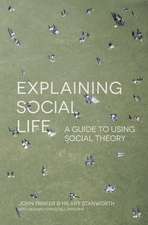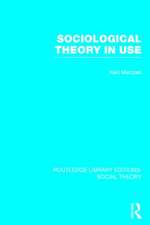Sociology in Action (Routledge Revivals): A Critique of Selected Conceptions of the Social Role of the Sociologist: Routledge Revivals
Autor Christopher Bryanten Limba Engleză Paperback – 13 noi 2014
| Toate formatele și edițiile | Preț | Express |
|---|---|---|
| Paperback (1) | 369.73 lei 6-8 săpt. | |
| Taylor & Francis – 13 noi 2014 | 369.73 lei 6-8 săpt. | |
| Hardback (1) | 986.91 lei 6-8 săpt. | |
| Taylor & Francis – 5 apr 2013 | 986.91 lei 6-8 săpt. |
Din seria Routledge Revivals
- 9%
 Preț: 801.69 lei
Preț: 801.69 lei - 8%
 Preț: 432.15 lei
Preț: 432.15 lei -
 Preț: 153.81 lei
Preț: 153.81 lei -
 Preț: 230.80 lei
Preț: 230.80 lei -
 Preț: 294.72 lei
Preț: 294.72 lei -
 Preț: 258.72 lei
Preț: 258.72 lei - 9%
 Preț: 764.34 lei
Preț: 764.34 lei - 9%
 Preț: 903.41 lei
Preț: 903.41 lei -
 Preț: 296.10 lei
Preț: 296.10 lei -
 Preț: 342.36 lei
Preț: 342.36 lei - 9%
 Preț: 606.35 lei
Preț: 606.35 lei -
 Preț: 317.54 lei
Preț: 317.54 lei - 9%
 Preț: 764.28 lei
Preț: 764.28 lei -
 Preț: 257.00 lei
Preț: 257.00 lei -
 Preț: 238.40 lei
Preț: 238.40 lei -
 Preț: 259.47 lei
Preț: 259.47 lei - 9%
 Preț: 903.80 lei
Preț: 903.80 lei -
 Preț: 326.26 lei
Preț: 326.26 lei -
 Preț: 258.66 lei
Preț: 258.66 lei -
 Preț: 294.97 lei
Preț: 294.97 lei -
 Preț: 308.89 lei
Preț: 308.89 lei -
 Preț: 199.85 lei
Preț: 199.85 lei -
 Preț: 347.49 lei
Preț: 347.49 lei -
 Preț: 295.04 lei
Preț: 295.04 lei -
 Preț: 389.39 lei
Preț: 389.39 lei -
 Preț: 257.00 lei
Preț: 257.00 lei -
 Preț: 343.21 lei
Preț: 343.21 lei - 9%
 Preț: 640.90 lei
Preț: 640.90 lei - 9%
 Preț: 619.48 lei
Preț: 619.48 lei -
 Preț: 228.88 lei
Preț: 228.88 lei -
 Preț: 257.67 lei
Preț: 257.67 lei -
 Preț: 245.10 lei
Preț: 245.10 lei -
 Preț: 258.52 lei
Preț: 258.52 lei -
 Preț: 258.72 lei
Preț: 258.72 lei -
 Preț: 368.93 lei
Preț: 368.93 lei -
 Preț: 246.37 lei
Preț: 246.37 lei - 9%
 Preț: 832.07 lei
Preț: 832.07 lei -
 Preț: 258.66 lei
Preț: 258.66 lei -
 Preț: 286.98 lei
Preț: 286.98 lei - 18%
 Preț: 695.85 lei
Preț: 695.85 lei - 9%
 Preț: 934.94 lei
Preț: 934.94 lei - 5%
 Preț: 231.22 lei
Preț: 231.22 lei -
 Preț: 267.15 lei
Preț: 267.15 lei -
 Preț: 200.66 lei
Preț: 200.66 lei - 9%
 Preț: 638.61 lei
Preț: 638.61 lei -
 Preț: 259.68 lei
Preț: 259.68 lei - 9%
 Preț: 1038.45 lei
Preț: 1038.45 lei -
 Preț: 389.43 lei
Preț: 389.43 lei -
 Preț: 302.13 lei
Preț: 302.13 lei -
 Preț: 302.25 lei
Preț: 302.25 lei
Preț: 369.73 lei
Nou
Puncte Express: 555
Preț estimativ în valută:
70.75€ • 74.06$ • 58.54£
70.75€ • 74.06$ • 58.54£
Carte tipărită la comandă
Livrare economică 08-22 aprilie
Preluare comenzi: 021 569.72.76
Specificații
ISBN-13: 9780415839976
ISBN-10: 0415839971
Pagini: 378
Dimensiuni: 138 x 216 x 20 mm
Greutate: 0.45 kg
Ediția:1
Editura: Taylor & Francis
Colecția Routledge
Seria Routledge Revivals
Locul publicării:Oxford, United Kingdom
ISBN-10: 0415839971
Pagini: 378
Dimensiuni: 138 x 216 x 20 mm
Greutate: 0.45 kg
Ediția:1
Editura: Taylor & Francis
Colecția Routledge
Seria Routledge Revivals
Locul publicării:Oxford, United Kingdom
Public țintă
Postgraduate, Professional, and UndergraduateCuprins
Acknowledgements; Part I: Introduction 1. The multi-paradigmatic state of sociology 2. The choice of paradigms for discussion 3. The sociology of knowledge or sociology in action? 4. Social development and macrosociology 5. The deterministic and active components of action 6. Consciousness and the problem of strategy 7. The relation between sociology and philosophy; Part II: Positivism 1. Introduction 2. Saint-Simon and Comte 3. Coda; Part III: Durkheim 1. Introduction 2. The crisis of modern societies 3. Towards social reconstruction and moral regeneration 4. Durkheim’s sociology: some general comments 5. Durkheim’s life and politics 6. Durkheim: an assessment; Part IV: La Sociologie active 1. Introduction 2. Intellectual sources 3. Basic principles 4. Work completed and in progress 5. La sociologie active: an assessment; Part V: Marx 1. Introduction 2. Conservatism and criticism 3. Alienated and liberation 4. Materialism and praxis 5. Marx’s praxis 6. Marx: an assessment; Part VI: Sociology in a Socialist Society – The Case of Poland 1. Introduction 2. The history of sociology in the Soviet Union and Poland 3. Polish theoretical sociology 4. The sociologies of class and occupations in Poland 5. Future prospects for Polish sociology 6. The functions of sociology in socialist societies; Part VII: Weber 1. Introduction 2. Vales and social science 3. Politics and science as vocations 4. Weber’s life and politics 5. Weber: an assessment; Part VIII: Dahrendorf 1. Introduction 2 Class and conflict 3. Class and inequality 4. Class, contest and change 5. Society and democracy in Germany 6. Uncertainty, science and politics 7. The social role of the sociologist 8. Dahrendorf’s life and politics 9. Dahrendorf: an assessment; Part IX: The New Sociology 1. Introduction 2. Personal troubles of milieu and public issues of social structure 3. Criticism and independence 4. The bureaucratic ethos 5. Sociology: profession or discipline? 6. The new sociology and reflexivity: an assessment; Part X: Conclusions 1. The non-availability of a neutral language for the discussion of sociology in action 2. Criticism and choice 3. Concepts, commensurability and action 4. The need for strategy; Bibliography.
Descriere
This book, first published in 1976, discusses four classical paradigms for sociology, including the positivism of Durkheim and Marx, and four contemporary developments or revisions of them. Unique in its approach and analysis of the relationship between sociology and action, this book is of value and interest to students of sociology and theory and professional sociologists.

























